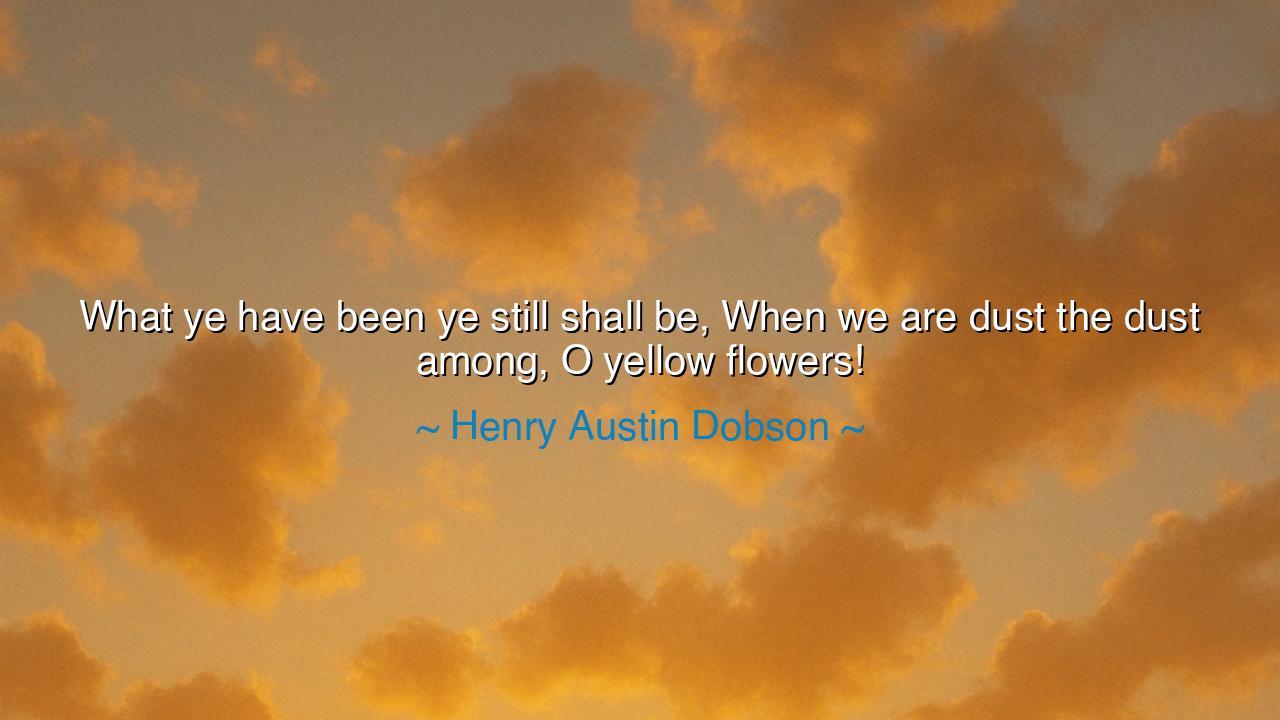
What ye have been ye still shall be, When we are dust the dust
What ye have been ye still shall be, When we are dust the dust among, O yellow flowers!






Henry Austin Dobson, poet of gentle verse and reflective heart, once wrote: “What ye have been ye still shall be, When we are dust the dust among, O yellow flowers!” At once simple and profound, this line binds the fleeting span of human life with the enduring cycle of nature. He speaks to the blossoms that return each spring, unchanged in essence, while men and women, once living and breathing, return to the dust from which they came. The flowers endure, while generations fade. Thus Dobson reminds us of both our mortality and the eternal continuity of the natural world.
The ancients would have understood this truth well. In the wisdom of Ecclesiastes, it is written: “One generation passeth away, and another generation cometh: but the earth abideth for ever.” The yellow flowers, like the rising sun and the turning seasons, testify that the earth’s beauty persists beyond the life of any single man. Human pride, kingdoms, and empires crumble, but the blossoms rise again, whispering the same silent hymn to those who remain. Dobson’s words are an echo of this eternal voice: you are mortal, but life itself is unbroken.
History also teaches us this lesson. Consider the ruins of Pompeii, buried under ash, where once a vibrant city thrived. For centuries it lay silent, yet when unearthed, among the relics of stone and the remains of men, there were impressions of leaves and flowers, their forms preserved in volcanic embrace. While the people were long turned to dust, the testimony of nature endured, etched into the earth as if to say: “What ye have been ye still shall be.” The flowers remind us that though we pass, life itself renews without ceasing.
Dobson’s words are not meant to crush us with despair, but to awaken us to humility. The flowers are not only symbols of our smallness but also of beauty unending. If they outlast us, then we must learn from them: to live simply, to bloom brightly in our season, to let go when the time of fading comes, and to trust that life continues beyond our own measure. Our legacy, like theirs, lies not in permanence of body but in the fragrance, the color, the memory we leave behind in the hearts of others.
There is also a call to reverence in these lines. When you walk among yellow flowers, see them not merely as decoration, but as living scripture — teachers of patience, renewal, and eternity. They rise after winter’s death, they thrive without demand, and they return faithfully even when men forget them. Their persistence is a quiet rebuke to human arrogance and a tender invitation to gratitude. To honor them is to honor the eternal rhythm of life.
Practical wisdom flows from this reflection. Do not strive to resist mortality with vain struggle; instead, embrace it with dignity, as part of the great cycle. Grieve when loss comes, but also look to the flowers and remember that life renews itself. Plant gardens, nurture the earth, leave behind beauty for those who follow. In this way, though you too return to dust, your presence will remain, woven into the pattern of renewal, just as the blossoms return each spring.
So hear this, O children of the future: the yellow flowers will outlast us, yet their endurance is not mockery but gift. They remind us that life continues, that death is not an end but a return. Therefore, live as the flower lives — bloom in your time, offer your fragrance and your beauty freely, and when you fall to the earth, let the seeds of your deeds bring forth new life. For though we are dust among dust, life itself is eternal, and in living well, we become part of that endless song.






AAdministratorAdministrator
Welcome, honored guests. Please leave a comment, we will respond soon